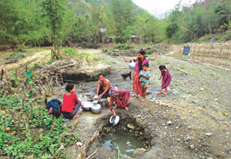Queen of Hills & Roof of Rangamati in Bangladesh pleads for rainwater to stay longer
Queen of
Hills & Roof of Rangamati in Bangladesh pleads for rainwater to stay
longer
Sajek Valley is the kingdom in the clouds within the reach of
man
Famously known as the queen of hills Sajek Valley is located 1450 feet
above sea level. The local inhabitant’s livelihoods are tourism and Jhum
cultivation. There are around 95 tourist resorts. The community in this region lives
below the poverty line despite being a thriving tourist region. An arduous
journey of walking downhill from 2000 to 3000 Ft is a task that is part of the
daily routine of the local inhabitants. They use simple household utensils to carry
water from the source.
In addition to the demands of the local inhabitants, there is a demand
for water from tourists coming to the region and in the resorts for cleaning, gardening
and washing vehicles. The area has an average rainfall close to 2000ml. During
the monsoon months in June, July and August has a high rainfall of close to
100ml.
A lasting solution for water scarcity needs to be explored not only for
Sajek
Water scarcity becomes severe and intense in this place because waterfalls,
rainwater, and springs become dry and have less water in the winter season than
in summer to meet the demand of the local communities. Due to the poor
maintenance and care, even the available few public taps are of not much use.
At present, some get their water supplies to plastic tanks by paying 20US Dollars.
Safe drinking water scarcity is a burning
issue in the present situation of Bangladesh which needs to be addressed as
well as in Sazek. Though the water crisis is a major issue, there is
less attention and effort to address the issue.
Ferro cement tanks that can store the rainwater during the monsoons until the next summer
The crisis can be reduced if proper steps should be taken such as educating them about the geographical location, pollution, hygiene, physiographic importance, etc., highlighting the problem through media, recycling rainwater, proper drainage management and sanitation says Engineer and CEO of O Creeds from Bangladesh Shahadat Hossain at the 2nd international conference of SARNET proposing recommendations to address the water scarcity in Sajek valley. A maximum of 110.75 m3/year of rainwater can be collected from a 100 m2 rooftop area of Sazek said Shahadat explaining the proposed solution to address the water scarcity. Prior to the conference SARNET also held an international training programme on rainwater harvesting and storage systems for which Shahadat was a participant. He expressed hope and optimism about his learning experiences as a participant in the Technician training programme and the SARNET conference. “People in the Sazek valley can save water and save money if they construct Ferro cement tanks either the Pumpkin shaped tank popular in Sri Lanka or Calabash tank used in the African region. We will be utilizing the knowledge and skills we have gained in Sri Lanka to implement this rainwater harvesting storage system to address water scarcity” said Engineer Hossain concluding his presentation.









Comments
Post a Comment